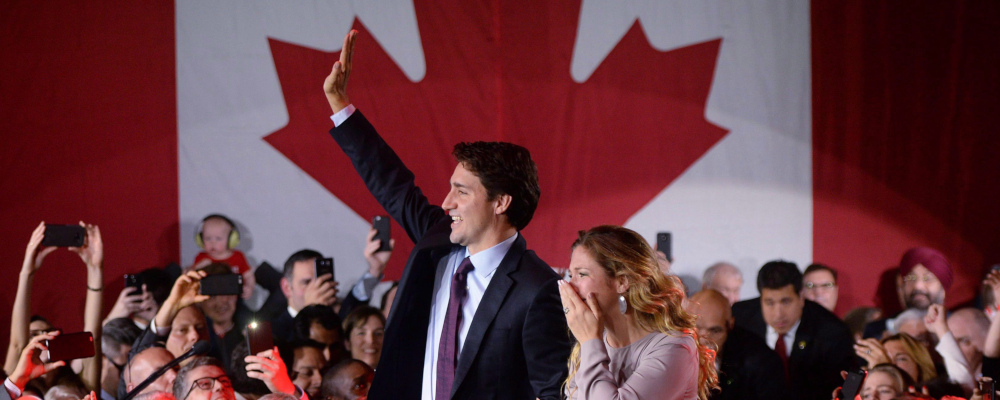A year ago, Canada2020 — a think tank mostly aligned with the federal Liberal government — participated in a Global Progress project that published Insurgents: Inside a New Generation of Progressive Leadership.
This mostly ignored, 50-page online report contains five essays written by senior campaign officials for self-consciously progressive political campaigns in Italy, Canada, New Zealand, Hungary and France. It summarizes their collective lessons over the past decade with four major themes essential to successfully implementing a progressive agenda: “authentic leadership, a sense of insurgency with a clarity of purpose, the ability to unify, and a willingness to experiment with organizational innovation.”
Parsing this in detail requires more than a column, but briefly applying the template to Prime Minister Justin Trudeau’s Canadian expression of progressivism is worthwhile. The authors suggest that Trudeau was able to achieve his “authentic relationship” with Canadian voters by building his coalition within the Liberal Party with an entirely new set of primary players by kicking out the Liberal Senators and opening up membership to anyone without even a membership fee.
Together with a clear sense of values that all Canadians understand him to have — agree or disagree — is core to his appeal, the authors argue.
Trudeau has implemented “insurgency with purpose” especially with his economic policies, achieving power in 2015 by promising deficits when even the NDP was pushing the orthodoxy of balanced budgets. Since then, he has governed with an entirely new calculus regarding government’s fiscal capacity.
“Unity and Inclusion” in the global sense is understood as avoiding division. Indeed, the polling confirms that Trudeau has succeeded in maintaining the largest pool of accessible voters. He hasn’t quite achieved his goal of replacing the NDP (who were the official Opposition entering the 2015 election) and the Greens (who are capable of capturing the imagination of a segment of Canada’s progressive crowd between elections, but not their votes when it counts). But he’s not that far off.
The final component is “organizational innovation.” Here too Trudeau’s Liberals have been among the global leaders of using technology and big data to bypass traditional media outlets and directly reach a growing swath of Canadian voters through social media.
As op-eds reflect on the recent tenth anniversary of the 2011 election, as well as speculate on the almost inevitable 2021 election, there are some important parallels to note. In both cases, a prime minister will be seeking a third mandate from the electorate and entering a campaign from a minority government position. However, in 2021, it seems that those Canadians less inclined to embrace Trudeau’s “progressive” agenda may have a thing or two to consider if they are to succeed in their ambitions of removing him from power.
The day after Stephen Harper won his first minority in 2006, Michael Van Pelt and I penned a piece that suggested this was the beginning of a realignment of political arrangements that had represented a “pan-Canadian consensus” for several decades. We warned, however, that Conservatives should not be too hasty in expecting the implementation of a conservative agenda. At best, the 2006 victory represented a coalition victory. Getting beyond the immediate platform to lasting change in a conservative mold would prove difficult given the changing values in Canada.
In 2011, Harper won his third election, though this time it was “a strong, stable, majority, national government.” At that time, Michael and I updated our analysis, predicting that the decade to come would be characterized by “dissensus” — the opposite of consensus. We suggested that a decade later, “Conservative infighting is likely to burst into a more public feud.” Meanwhile, the political left would coalesce around the attraction of power, even if they continued to debate certain values, possibly forging a new consensus in the process.
Trudeau’s Liberals have been among the global leaders of using technology and big data to bypass traditional media outlets.
This wasn’t the prevalent view at the time. Peter Newman wrote a book When the Gods Changed: The Death of Liberal Canada dismissing the Liberals as “yesterday’s party,” worrying that Canada was heading to the polarization of an American two-party system. “The plain fact is that for at least four years Stephen Harper can do anything that strikes his fancy: his post-election moves to cut the funding for political parties — his own having an established financing system — and his appointment of Tory senators who were rejected when they ran for office speak to power wielded without regard to the consequences to the democratic fabric.” History clearly did not unfold in the manner Newman predicted. There are many who would blame Harper for this, and I am sure that even he, in his candid moments, would admit there are things he would have done differently.
However, and this is the central point, politics is downstream from culture and the range of options available to Harper were limited. Successful political movements can only work with the values that exist in the populace, organize coalitions, and inspire with big ideas that mobilize voters towards a particular action. During their decade of power, the Conservatives were dealing with a coalition of ideas but not a coherent philosophy. The Liberals have at least two things in their favour. They consistently signal a much more coherent set of populist values than the Conservatives do. They also employ a strategy that is tremendously effective in translating the appeal to populist values into votes (if the global playbook outlined in Insurgents above has any validity.)
The Conservative Party today does not represent any coherent bold ideas that inspire or are able to hold it together. They seem about to enter into a campaign arguing, “We don’t like Justin Trudeau and neither should you — trust us to govern better.” If that’s all that’s on offer, the results of the next election are easily predicable. The only question of consequence on the morning after the election will be how the growing disillusionment within Canada, particularly in the western provinces but also some other regions, will be managed and if the consequence will only be a radicalization of our politics or outright moves for separation.
Conversation at the Hub has divided between the optimists and the pessimists, for which Howard Anglin’s critique of the founding essay has been the flagship where he encouraged Canadian conservatives to go local and cheer up, “since there’s nothing we can do.” If anything, the Global Insights project reinforces Anglin’s take that the core values at stake here are part of a western civilization drift in which Canada’s role will be no more than a footnote.
But there is a danger of missing the reality between the binary alternatives of “act local in hope, since there is nothing you can do about the big picture” or “despair, the world is doomed and we need to fight with all our political might.” While virtues and strong institutions are indeed cultivated locally, the big ideas that shape our values are often given weight by the politics and structures that frame how we can act. If Conservatives want to succeed against the cultural forces that are aligned against them, especially in a context in which the Liberals are being smart and effective in translating their values into meaningful political coalitions, the solution is neither in a full-throated culture war against progressivism nor in a campaign that seeks to sidestep the core issues by simply arguing that the Liberals are managerially incompetent.
The lesson, both of a decade ago as well as in this moment, is that for long-term success, conservatives need to articulate big, inspiring ideas that paint a positive picture of how their view of the world both commends itself to and corresponds with reality. There probably isn’t much of a coalition that can be cobbled together for short-term Conservative success that wouldn’t end up with the same problem of ineffectiveness in government. But if the party continues only to dabble at the policy margins and sidesteps making positive arguments about what their values have to contribute in the long-term, the consequence of an election in 2021 will likely be long-lasting. It will solidify a political majority in this country, united around some inarticulate version of progressive ideals.
The question regarding the future of Canada, and whether this is but another chapter or the embedding of a longer direction, depends on whether Prime Minister Trudeau is more successful in using a third-term majority government to establish a direction than was Prime Minister Harper.
If he is, the dissensus is over and those who don’t like it will only be left talking about what new arrangements make sense.
Recommended for You

How the resource royalty rollercoaster continues to shape Alberta’s budgets

Social shaming for antisemitism is more effective than police crackdowns, says Jesse Brown

Why do activists want to shut down Alberta’s support for independent schools?

The government’s proposed anti-hate law is a necessary response to extremism




Comments (0)